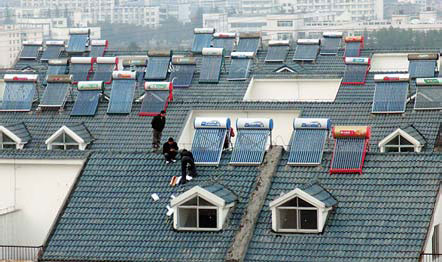 |
|
The China Solar Valley being built in Dezhou, Shandong province, is making shining progress at harnessing solar power, especially amid the background of surging oil prices, a national power shortage and pollution. |
However, much more efforts from individuals, the solar industry and the government are needed to call China a true solar giant.
China Solar Valley, more than 330 hectares in area, covers a wide range of solar technologies such as water heating, air conditioning and solar-equipped buildings, is trying to develop itself as the country's center of solar thermal production, logistics, research, quality testing and tourism.
The valley's conference building for the 4th International Solar Cities Congress in 2010 has applied advanced solar technologies and the 60,000-squre-meter floor area saves more than 70 percent energy, compared to a conventionally lighted and heated building of the same size.
Himin Solar Energy Group, the creator of China Solar Valley, is a leading solar water heater manufacturer in China with an annual production of about 3 million square meters of water heaters, which equals the total amount produced in the European Union and twice the amount in the North America.
Besides Himin, currently there are nearly 4,000 solar water heater manufacturers in China, producing more than 15 million square meters of water heaters every year, the annual growth rate reaching 25 percent.
Though China produces an enormous amount of the heaters, the installation rate in China of them among civilian residences is less than 10 percent, much lower than 80 percent of Israel and 20 percent of Japan, according to figures from china5e.com and the Xi'an Science and Technology Bureau.
Most produced in China are for export. The export value of Chinese solar water heaters in 2007 was $65 million, a 28 percent increase compared with the previous year. The heaters were exported to more than 50 countries in Europe, America, Africa and Southeast Asia, according to a Research Report on Chinese Solar Water Heater Industry 2008.
What accounts for the dearth of solar water heater use in China? Individuals, the solar industry itself and the government are responsible in one way or another.
There is a general ignorance of energy conservation and unfamiliarity with solar water heaters among most Chinese, according to Huang Ming, board chairman of Himin Solar Energy Group.
Huang notes that most Chinese routinely waste water and electricity daily and the higher initial cost of the heaters is also a barrier despite that that fact that a heater can save 450 kWh of electricity per square meter every year.
"An electric heater costs only 1,000 yuan or so, while a solar one costs at least 3,000, in addition to its complex installation," a resident in Fuzhou, Fujian province complains.
The price of a solar water heater has been reduced to an average of around 2,000 yuan due to technologic innovations and competition within the industry, but "pressure on manufacturers is rising due to cost increases of raw materials and labor", Huang says.
A third factor lies in the poor quality of some solar water heaters, which is denting consumers' confidence in the solar industry as a whole.
Because of absence of strict market access barriers, fly-by-night solar heater makers have flooded the market with cheap, inferior heaters and poor or even no after-sale service. These products occupy about a 70 percent of the market China, Huang estimates.
Consumers burned by these deals then conclude that solar water heaters don't work well.
To solve the problem 17 national standards have been set for solar water heaters and two State-level test centers have been put into use.
"The next step is strict implement of these policies," Wang Jiuwei, brand director of Himin, says.
The Chinese government has taken some measures to encourage the development of the solar water heater industry, and other policies are also on the way, but the measures are far from enough, say observers.
So far, about six provinces including Jiangsu, Guangdong and Hainan have required government buildings less than 12 stories high and new buildings such as hotels and restaurants to install solar water systems. But there are obstacles to seeing that it is done.
Installation, design and maintenance costs for the solar systems increase expenses for real estate developers by 200 or 300 yuan per square meter. Developers therefore are unwilling to follow the regulation, especially with the current slump in the Chinese real estate market.
Secondly, in order to keep residential areas uniform in appearance, some property companies forbid the installation of solar water heaters.
Resistance from real estate developers and property companies reflects absence of supporting policies from the government for solar water heaters. If favorable policies such as financial supports and tax cuts were provided for real estate developers and unified standards were set for solar-equipped buildings, the result could be different, says Huang.
"I have a dream that one day every Chinese family will high quality solar water heaters," he says. "To realize such a dream, individuals and the government as well as our solar industry should contribute all their efforts. "
(China Daily August 25, 2008)